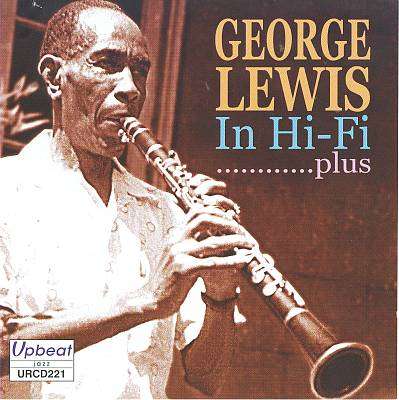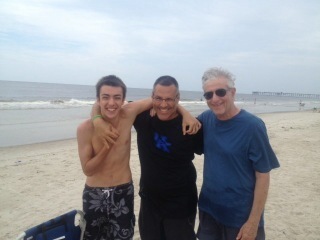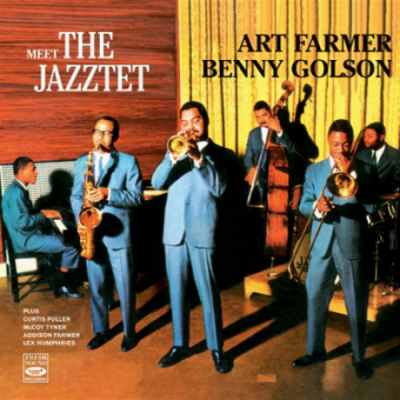
In memory of George Lewis, Great Jazzman
1
Man is the animal that knows
the clarinet
makes his living
on the docks, a stevedore,
110lbs., carrying what loads
he can
the Depression comes along,
his teeth rot, no money and
he has to accept silence
2
Thirteen years
later
they put the instrument
back together
with rubber bands
bought him
new teeth
and then he began
I C E
E I
C C
I E
C C
E I
I C E
C————————————————-C
R R
E E
A A
M M
E R A V
V T W E
O H E S
M———————————————————————-T
Y I
B N
U I
C E
K L
E O
T’ H
S G O T A
One song they say
was pure
uninhibited joy
words
cannot tell you
survived so long
in those empty jaws
3
He lived and died
there.
Had a New Orleans funeral.
Leading the mourners
his old friends’ band
trudged
to the cemetery, heads
down, trombones scraping
the ground, slow tones of
“Just a Closer Walk…”
helping to carry
the solemn mud
of their steps.
Graveside,
words said, tears fallen,
they turned
to walk back;
a few beats on the big
drum, then soft plucking
of a banjo string-
in another block
the clarinet wailed
and then suddenly they were
playing
“The Saints…” full blast
and people jumped
and shouted and dances
just as he’d known they would.
4
Alright. There is a frailness
in all our music.
Sometimes we’re broken
and it’s lost.
Sometimes we forget
for years it’s even in us, heads
filled with burdens and smoke.
And sometimes we’ve held
to it and it’s there,
waiting to break out
walking back from the end.
*
Poignant Moment, listening to “Lakes” played by
the Pat Metheny Group, Sunset Beach, Summer,
1984
The song comes over me like a wheat field, my face
brushed by golden stalks
My spirit moves forward like a blind one and when
things touch me… I see them
How could I know there was so much tenderness
hidden in things, in my flesh?
How could I know the love for the white paint for
the porch of the house where it clings
and flakes? How could I know my daughter
would come back?
How could I know about the air or the inquiring,
efficient blood, returning to the cells?
I see the love of the pale blue wind for our clothes,
blown out from the line,
The wind loves our house, whistling through tiny
cracks, blowing steadily toward us.
There is something in me that listens and stirs.
Everything flows, grasping. Everything is
a kind of attachment, a music; time aching
through us.
It is too much to feel. I put down my pad. Even
breathing is a kind of ceaseless music.
I see we cannot rest, ever. We seek for love,
continually, carried along like dust, swept
across lakes. How did I ever come to be
here, to know these people, to love them?
Our need for love exceeds us, reaching ahead,
dark hair blowing like a torch in the halls
of the old castle. It goes ahead, looking
foe signs, listening, searching.
And then the wind catches it suddenly and lifts it,
swift and beautiful, carries it far out over
the lakes- sail without a boat, banner
of our incorrigible longings.
*
If This World Falls ApartIf This World Falls Apart
for Bennett
I never troubled to grasp the basic principles
of how my voice zings through the phone lines
and into your ear; and so, the phones out,
I could not even begin to get a handle on how
to recreate the way I could call to ask you
if this world had truly fallen apart, or
if this was another serious but passing crisis.
And the roads blocked by shattered trees,
I would have to walk over and ask you
and see what you thought.
That would take most of the day.
so I’d have to stay the night
and have supper at your house,
though I’m not sure how we would cook
without any power or light.
Fire, most likely, or eat cold out of the garden.
Millennia of human struggle and invention
would be lost if it depended on us –
two clueless poets collecting sticks
along a dark road;
men of lifelong impracticality,
depending on others to do
the functional things that repair our intricate
systems.
Although, on the other hand, there would be the dance
you would certainly do at sunset to lift our spirits.
And to accompany you, I would find
a hollow reed and put my fingers
over the holes I’d burned through it
and begin to blow.
__________
Lou Lipsitz grew up in Brooklyn and is now a psychotherapist and poet. He’s published four books of poems, the latest was If This World Falls Apart (Lynx House Press, 2011) which won the Blue Lynx award. His work has been widely anthologized. He lives in Chapel Hill, NC and attempts to play the harmonica. He loves jazz and Celtic music, especially.

Lou (right) with son Jon and grandson Zachary
































